De Amerikaanse schrijfster Amy Michael Homes werd geboren op 18 december 1961 in Washington DC. Zie ook alle tags voor A. M. Homes op dit blog.
Uit: Jack
“So, how’s Mom?” he asked.
“Okay.”
“And school?”
“The same.”
“Max?”
I nodded. It was his checklist. Every time we were together we went through this. He ran down his list of people, events, even actual objects that were in my life.
“Basketball?”
“The garden’s doing real well, and I think Max is getting back to sort of normal.”
I said it all at once to save him the trouble of having to hit on each thing, one at a time.
He smiled. “Good.”
We were quiet.
“When you’re ready, I want to take you to get your license.”
“That’s okay. Michael said he would. His car is smaller anyway.”
I flipped the visor back up into the ceiling.
“I want to, Jack. Is that all right?”
He reached across the car, swept my hair off my face, and rubbed my cheek with the back of his hand. “Yeah, sure, we’ll see,” I said.
“How about dinner Wednesday?” he asked as he pulled up in front of our house.
I nodded.
“We’ll go someplace nice, just you and me. Pick you up around seven.”
“Yeah, okay. See you,” I said as I got out.
He put the car in gear and pulled away without checking his mirrors. Luckily, nothing was coming. I worry about him. Sometimes I’m not sure his receiver is on the hook, if you know what I mean. I watched the blue Volvo creep down the street and wondered how I’d ever get it to fit in the goddamned parallel-parking place at the Motor Vehicle Administration.
“Salvation Army’s coming tomorrow,” Michael said when I walked into the kitchen. He was chopping vegetables with something that looked like the ax George Washington must have used when he cut down his cherry tree.”

A. M. Homes (Washington DC, 18 december 1961)
De Franse schrijfster Mazarine Pingeot werd geboren in Avignon op 18 december 1974. Zie ook alle tags voor Mazarine Pingeot op dit blog.
Uit: Mara
« Manuel, à l’arrière, observe les mêmes choses, qui construisent un paysage dont il éprouve l’épaisseur, la pérennité. Des siècles sont passés par là sans rien changer. Et rien ne changera. Il n’a pas confiance dans la volonté des hommes, ni même dans leur désir. Manuel attend patiemment, il observe, mais il n’interprète pas. Il se tient prêt. C’est sa seule sagesse.
Hicham quant à lui conduit gaiement, entretenant la conversation. La sortie de la ville fut difficile, des embouteillages, des policiers exaltés par leurs rôles, livrés à la colère que confère une once de pouvoir – sifflet au bec et hurlements inarticulés, gestes dynamiques et mécanisés. Mais une fois sur la route d’Asilah et de Larrache, les montagnes d’un côté, la mer de l’autre, il se tait. Ils ont pris l’autoroute, vide parce que chère. Ils écoutent radio 2 M, puis une cassette de Madonna, de sa période « Like a Virgin », puis plus rien parce que Mara arrête l’autoradio et ouvre grand sa fenêtre.
Ils sortent à Asilah, longent le rond-point jusqu’à la route cabossée qui dessert les plages. De grands eucalyptus font la haie, puis la route devient plus sinueuse, escarpée, les trous dans le bitume se font plus réguliers, les ânes remplacent les Fiat. Ils traversent quelques villages de bord de route. Un immeuble de six étages isolé s’érige en plein dans un virage dangereux, derrière lui s’étend la vallée où coulent des ruisseaux et où paissent des moutons, mais non, l’immeuble siège délibérément sur la route, comme si ses habitants l’avaient pris pour un balcon géant, dont le seul at trait est de voir ceux qui passent.”
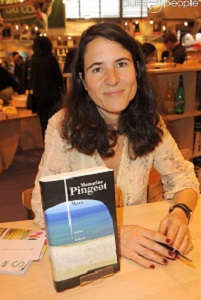
Mazarine Pingeot (Avignon, 18 december 1974)
De Amerikaanse schrijver Miles Marshall Lewis werd geboren op 18 december 1970 in The Bronx, New York. Zie ook alle tags voor Miles Marshall Lewis op dit blog.
Uit: Paris Noir
“Raising two preschool-age boys in Paris has me constantly gauging France’s racial politics with an eye toward America. Current neo-conservative president Nicolas Sarkozy once stoked controversy with a promise to clean the country of racaille (scum) during weeks-long rioting in 2005. (Nationwide civil unrest spread over the accidental electrocution of two Muslim teenagers who fled police interrogation in the suburban Clichy-sous-Bois projects.) Last year, Sarkozy also targeted the Islamic burqa-Muslim women’s religious traditional covering-as unwelcome in France, stopping short (as yet) of passing prohibitive legislation against it.
While I visited Harlem for a family Thanksgiving in 2006, an all-too-familiar news report broke: Local police had murdered an unarmed black man, 23-year-old Sean Bell, in Queens on the night before his wedding day. Recounting the historical police victimization of other African Americans to my French wife, her horror served as a reminder that this type of thing went largely unheard of in her country. We are both appalled by Sarkozy’s Muslim scapegoating, but thankful that police killings of blacks in cold blood on a semi-regular basis isn’t part of the French social fabric. And the Gallic president has yet to extend his anti-immigration stance to American expatriates, no matter what our color.
I have learned that the comfortability of being black in France clearly depends on one’s origins. Renewing my annual residence permit every summer (ultimately being granted a 10-year card in 2009), I always breezed through the préfecture office’s heavily bureaucratic process while watching African immigrants be hassled over minute details. Following in the footsteps of Baldwin and Wright as a black American expat in the 21st century is one thing, but navigating French life with Algerian or Cameroonian roots is quite another.”
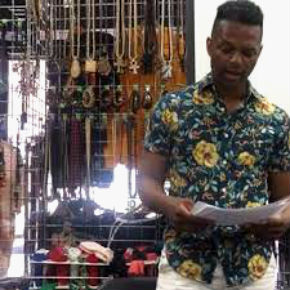
Miles Marshall Lewis (New York, 18 december 1970)
De Zweedse dichter en schrijver Viktor Rydberg werd geboren op 18 december 1828 in Jönköping, Zweden. Zie ook alle tags voor Viktor Rydberg op dit blog.
Tomten (Fragment)
Går till visthus och redskapshus,
känner på alla låsen —
korna drömma vid månens ljus
sommardrömmar i båsen;
glömsk av sele och pisk och töm
Pålle i stallet har ock en dröm:
krubban han lutar över
fylls av doftande klöver; —
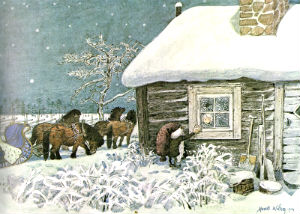
Illustratie bij Tomten door Harald Wiberg
Goes to the storehouse and toolshop doors,
Checking the locks of all,
While the cows dream on in the cold moon’s light,
Summer dreams in each stall.
And free of harness and whip and rein,
Even Old Pålle dreams again.
The manger he’s drowsing over
Brims with fragrant clover.
Viktor Rydberg (18 december 1828 – 21 september 1895)
Borstbeld door John Börjesons in Jönköping
De Russische dichter en schrijver Jakov Petrovitsj Polonski werd geboren in Rjazan op 18 december 1819. Zie ook alle tags voor Jakov Polonski op dit blog.
Song of a Gypsy Girl
Pile of embers in the darkness,
Sparks expire as they fly –
Night conceals us from the passing,
On the bridge we’ll say good-bye!
At the parting, shawl of crimson
Cross my shoulders thou shalt lace,
At an end the days swftipassing,
Met within this shaded place.
In the morning, with first splendour,
All my life compelled to rove –
I shall leave with other gipsies
Seeking happiness and love.
How does fate foretell my future?
Who, to-morrow by my side,
O’er my heart will loose with kisses
Knots by thy dear hand fast tied?
Flash of embers in the darkness,
Sparks expire as they fly –
Night conceals us from the passing,
On the bridge we’ll kiss good-bye.
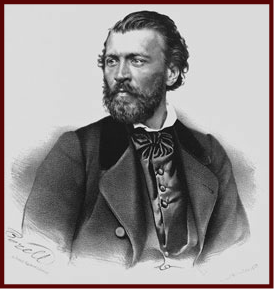
Jakov Polonski (18 december 1819 – 30 oktober 1898)
De Birmees – Britse schrijver Saki (pseudoniem van Hector Hugh Munro, een naam gekozen uit de Rubaiyat van Omar Khayyam) werd geboren op 18 december 1870 in Akyab, Birma. Zie ook alle tags voor Saki op dit blog.
Uit:The toys of peace
“The Bourbon period,” said Harvey, with some disapproval in his voice.
“We’ve got to know something about Louis the Fourteenth,” continued Eric; “I’ve learnt the names of all the principal battles already.”
This would never do. “There were, of course, some battles fought during his reign,” said Harvey, “but I fancy the accounts of them were much exaggerated; news was very unreliable in those days, and there were practically no war correspondents, so generals and commanders could magnify every little skirmish they engaged in till they reached the proportions of decisive battles. Louis was really famous, now, as a landscape gardener; the way he laid out Versailles was so much admired that it was copied all over Europe.”
“Do you know anything about Madame Du Barry?” asked Eric; “didn’t she have her head chopped off?”
“She was another great lover of gardening,” said Harvey, evasively; “in fact, I believe the well known rose Du Barry was named after her, and now I think you had better play for a little and leave your lessons till later.”
Harvey retreated to the library and spent some thirty or forty minutes in wondering whether it would be possible to compile a history, for use in elementary schools, in which there should be no prominent mention of battles, massacres, murderous intrigues, and violent deaths. The York and Lancaster period and the Napoleonic era would, he admitted to himself, present considerable difficulties, and the Thirty Years’ War would entail something of a gap if you left it out altogether. Still, it would be something gained if, at a highly impressionable age, children could be got to fix their attention on the invention of calico printing instead of the Spanish Armada or the Battle of Waterloo.
It was time, he thought, to go back to the boys’ room, and see how they were getting on with their peace toys. As he stood outside the door he could hear Eric’s voice raised in command; Bertie chimed in now and again with a helpful suggestion.”
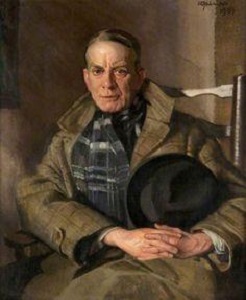
Saki (18 december 1870 – 14 november 1916)
Portret door William Oliphant Hutchison, 1939
De Britse toneelschrijver Christopher Fry, pseudoniem van Christopher Harris, werd geboren in Bristol op 18 december 1907. Zie ook alle tags voor Christopher Fry op dit blog.
Uit: The Dark is Light Enough
“GELDA: Yes, I know. We’ve been given the chance to think again.
GETTNER: I’m interested, naturally.
We have to be prepared; first thoughts Have shallow roots, I imagine.
GELDA: Be reassured.
It’s also Peter’s wish we should keep you safe.
GETTNER: Is it, by Peter?
Then, by Peter, he shows
very praiseworthy nobility.
And you? You will hardly think the bargain bearable.
You’re deeply regretting it.
GELDA: I think neither
Of deep regrets nor of no regrets.
You Are the only gainer, Richard, so be grateful.
GETTNER: Isn’t a man to know the reason For his salvation? I give my gratitude
To what I understand. You wouldn’t endure
Being praised for what, after all, may be
A whim of the moment.
Come, now, Gelda; I’ve some hours to spend in solitary thought,
And I should be happier if all the devil doubts
Could be exorcised.
GELDA: Very well, I’ll tell you. I was a failure to you once.
I know No more about that than I did.
But now In the simpler matter of guarding you I shall try not to fail.
GETTNER: Is there another Word in the language so unnecessary As ‘fail’ or ‘failure’?
No one has ever failed to fail in the end:
And for the very evident reason
That we’re made in no fit proportion
To the universal occasion; which, as all
Children, poets, and myth-makers know,
Was made to be inhabited To pair with that, unless I was willing
To be the misfortune around the house,
The disappointer of expectations,
Affecting virtue so that I should not see
The shadow go across you. I preferred to remain unracked, as I preferred
To stay silent, since it wasn’t for me
To recreate one word fit to stand
Beside reality, unhumiliated.
And therefore, with mockery refused,
Failure hardly presents itself.“
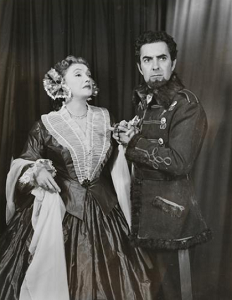
Christopher Fry (18 december 1907 – 30 juni 2005)
Katharine Cornell als Countess Rosmarin en Tyrone Power als Richard Gettner in een opvoering in New York, 1955
De Duitse schrijver Thomas Strittmatter werd geboren op 18 december 1961 in St. Georgen in het Zwarte Woud. Zie ook alle tags voor Thomas Strittmatter op dit blog.
Uit: Viehjud Levi
„VIEHJUD LEVI Sag, Kreszenz, bin ich nicht wohlgelitten gewesen, hab ich Feind? Wohlgelitten bis…
HORGENBAUER Bis?
LEVI Bis die Bahnmenschen gekommen sind. Hab ich nicht immer schöne Preis gemacht? Hab ich euch beschissen? No, ich bin mein Lebtag ein ehrlicher Mensch gewesen, mein Lebtag grundehrlich. Hat mir schon mein Vater selig so gesagt, und der Sohn hat sich daran ge-halten.
HORGENBAUER Über deine Preise kann ich nicht klagen.
VIEHJUD LEVI Grad du wirst es wissen, Andres, grad du. Hab ich net ge-holfen, wo Not am Mann war, wos gegangen ist, no? Sag!
KRESZENS Das hat er schon, Andres.
ANDRES Komm, pack an.“
(…)
LEVI Ja, da leidens net, die Viecher, wenn einer hat ein Pistol. Verreckens auf der Stell. Sag, Andres, wo hast denn du den schönen Pistol her?
HORGENBAUER Den Pistol? Geliehen. Gehört nicht mir.
VIEHJUD LEVI Ah so, geliehen. No, ein schöner Pistol. Eine gute Waff. Könnt wohl auch so einen Pistol brauchen. Gefährliche Zeiten. Na, wenigstens leiden sie nicht dabei, die Viecher.“
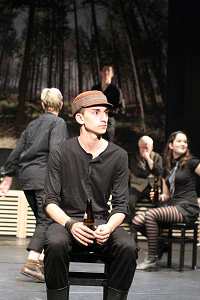
Thomas Strittmatter (18 december 1961 – 29 augustus 1995)
Scene uit een opvoering in Baden-Baden, 2013
Zie voor nog meer schrijvers van de 18e december ook mijn blog van 18 december 2016 deel 2.
Zie voor bovenstaande schrijvers ook mijn blog van 18 december 2008 en eveneens mijn blog van 18 december 2007 en mijn blog van 18 december 2006.
